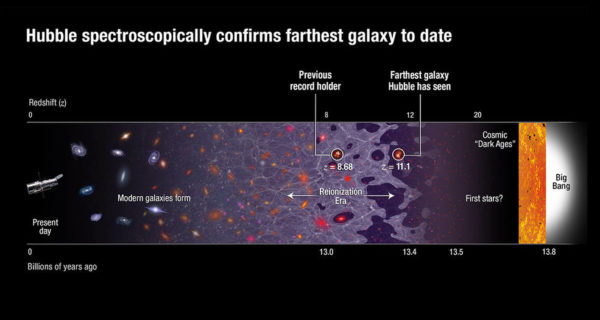“A human being is part of a whole, called by us the Universe, a part limited in time and space. He experiences himself, his thoughts and feelings, as something separated from the rest a kind of optical delusion of his consciousness. This delusion is a kind of prison for us, restricting us to our personal desires and to affection for a few persons nearest us. Our task must be to free ourselves from this prison by widening our circles of compassion to embrace all living creatures and the whole of nature in its beauty.” -Albert Einstein
If you're talking to someone across the same room, what the two of you perceive as time and space might match up perfectly, to the limit of what each of you can measure. But if one of you moves quickly relative to the other, if you experience different gravitational fields or spacetime curvatures, or if the space of the Universe between you is expanding, times and distances will cease to line up.
 Galaxy cluster SDSS J1004+4112. Defining a distance to this object is not so simple. Image credit: ESA, NASA, K. Sharon (Tel Aviv University) and E. Ofek (Caltech).
Galaxy cluster SDSS J1004+4112. Defining a distance to this object is not so simple. Image credit: ESA, NASA, K. Sharon (Tel Aviv University) and E. Ofek (Caltech).
This isn't a flaw of yours in any way, but rather an inevitable feature of special and general relativity. Observers in different locations can never agree on definitions of distance and time, particularly in an expanding Universe. So we invent some alternate definitions for differently scaled types of distance and time: conformal time and comoving distance, to help us understand what's going on in the Universe.
 Hubble spectroscopically confirms farthest galaxy to date, at a redshift of 11.1. Image credits: NASA, ESA, and A. Feild (STScI).
Hubble spectroscopically confirms farthest galaxy to date, at a redshift of 11.1. Image credits: NASA, ESA, and A. Feild (STScI).
Here's what they mean and why we do it, only on this week's Ask Ethan!

“One of the most counterintuitive lessons of Einstein’s relativity is that there’s no such thing as absolute space or absolute time.”
Is that absolutely true?
“This is incredibly useful when we’re doing simulations of how structures like stars, galaxies and clusters-and-filaments form in the Universe. Sure, gravitation is at work, but the Universe is expanding the whole time as well.”
Regardless, for all practical purposes, the universe is NOT expanding.
You’re not expanding, I’m not expanding,
our distances from the sun and moon aren’t expanding, etc.
You know?
But is the universe expanding for impractical purposes?
Hi Ethan, sorry to bother you - hope you are well by the way,
I'm trying to track down a comment I made in response to your idea for an explanation of why dwarf galaxies have higher dark-matter, namely that dwarf galaxies had more baryonic matter in the past but loses it from the galaxy at a faster rate then DM.
I've checked the post I thought my comment was in, but it's not there. It definitely got published at the time. One explanation is that this dwarf galaxy thing plus your idea (it might be a mainstream idea you were reporting) is one of the topics you re-run as a filler?
Could you let me know. My comment was basically pointing to some corollaries were you idea to prove correct, plus some elementary math.
Help me out man, if at all possible!!!!
"Is that absolutely true?"
Isn't that absolutely irrelevant?